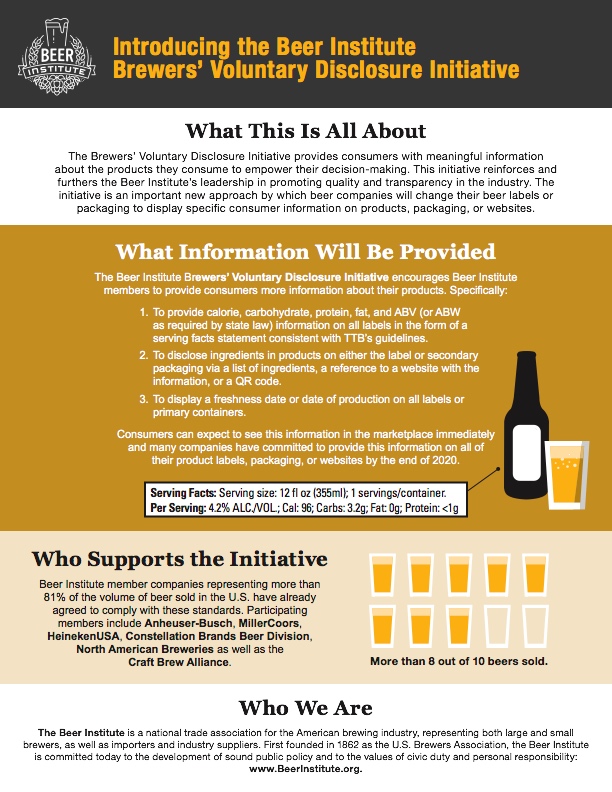
The Beer Institute, a Washington D.C.-based trade association representing domestic and international beer companies, has launched a new initiative asking brewers large and small to display caloric and nutritional information on individual products, packaging and websites.
Calling it the “Brewers Voluntary Disclosure Initiative,” the BI is encouraging its 44 brewer and importer members – as well as more than 4,000 non-member craft breweries — to voluntarily include a serving facts statement on their products.
As part of its push for greater consumer transparency, the BI is also asking brewers to disclose ingredients on either the label or secondary packaging and to provide freshness dating via ‘born on’ or ‘best by’ date codes by 2020.
Six major beer companies – Anheuser-Busch InBev, MillerCoors, Heineken USA, Constellation Brands, North American Breweries and Craft Brew Alliance – have already agreed to follow the new “guidelines” put forth by the BI.
Combined, the six companies represent more than 80 percent of the beer sold in the U.S., BI spokeswoman Denise Dunckel told Brewbound.

In a press release, Jim McGreevy, the group’s CEO, described the disclosure initiative as a “step in the right direction to demonstrate a commitment to quality and transparency through these voluntary measures.”
“Providing meaningful information will ultimately empower the consumer when making decisions regarding the beer beverage of their choice,” he said.
The push toward greater beer label transparency is being brought forth by the lobbying group in part to aid restaurants and foodservice chains that will be required to disclose the caloric value and supplementary health criteria of beer, as well as other food and beverages in 2017, as part of the FDA’s new menu labeling rules.
“It’s to be responsive to an obligation that we know is going to come down on retail partners,” Dunckel said of the timing, noting that many beer companies would be responsible for supplying nutritional information to retailers.
“We think that the voluntary disclosure guidelines fit into that (the FDA menu labeling rules) in terms of providing consumers more information about what they are actually consuming,” added BI vice president and general counsel Mary Jane Saunders.

Craft Brew Alliance CEO Andy Thomas said he believes the move illustrates the beer industry’s collective ability to “preempt government regulation by self-regulating.”
“The industry has a record of trying to cut to the chase before we are forced to do something and I think there is enough writing on the wall to know this is the direction that everyone is heading,” he said.
Indeed, alcohol giant Diageo – which owns popular labels such as Johnnie Walker, Ketel One and Guinness — has for years advocated for voluntary disclosure statements and has recently stated its intent to display nutrition and serving facts information on all of its brands as part of the company’s “Diageo Consumer Information Standards.”
“We believe people should have the best possible information to make informed choices about what they drink: this includes alcohol content and nutritional information per typical serve,” CEO Ivan Menezes said via a press release last month.
“I think it is clever to take the high ground before someone tells you to go there for regulatory reasons,” added Thomas.

Beer companies have actually been allowed to print serving facts statements on labels since May of 2013, when the Alcohol and Tobacco Tax and Trade Bureau (TTB) – which is responsible for approving alcohol labels – issued ruling 2013-2 that modified a 2004 judgment prohibiting the use of “false or misleading claims or representations about calorie or carbohydrate content in the labeling and advertising of wine, distilled spirits, or malt beverages.”
As part of the 2013 ruling, the TTB authorized voluntary disclosures about nutrient statements, including calorie and carbohydrate content, and determined that serving facts statements allowed industry members to “provide truthful, accurate, and specific information to consumers about the nutrient content of their products on a per serving basis.”
But historically, most major beer suppliers have shied away from voluntarily listing nutritional information such as calories, carbohydrates, protein and fat on labels other than light beer in fear that some drinkers would actually abstain from purchasing products that contained higher calories.

A growing number of legal drinking age consumers, however — craft beer drinkers in particular — are not only seeking greater label transparency but they are also interested in striking a healthier balance between regular alcohol consumption and routine exercise, according to a survey jointly developed by Nielsen, The Harris Poll and Brewbound.
According to that survey, 78 percent of craft beer drinkers believe it is important to read food and beverage nutrition labels while 65 percent of all alcohol beverage drinkers said they would favor having nutrition labels on products.
Nevertheless, the notion that some consumers would skip over certain products after realizing that their favorite IPA could contain upwards of 300 calories still looms for some beer industry executives.
“There might be some sticker shock,” Thomas said of the calorie count on some higher-octane brews. “But in the long-term, being transparent will help you be more relevant to the consumer and help you brew beers that consumers want to drink.”
CBA – which makes and markets the Kona, Widmer, Redhook, Omission and Square Mile Cider brands, and has strategic partnerships with North Carolina’s Appalachian Mountain Brewery and Massachusetts’ Cisco Brewers — expects to transition the majority of its labels within the next 18 months, Thomas said.

For its part, MillerCoors told Brewbound that it already provides serving facts panels on more than a dozen brands, including big labels like Coors Light and Miller Lite, as well as Blue Moon and its new Henry’s Hard Soda offerings.
While the BI’s new disclosure initiative is not mandatory, the six companies who have initially said they would begin listing nutrition and serving facts information will have until the end of 2020 to “achieve compliance across their product lines,” the BI said.
This should give most beer companies enough time to adjust label designs and work through their current packaging inventories and purchase commitments without incurring a large financial hit, Thomas added.
And an effort to help inform both consumers and policymakers, the Beer Institute said an ad (below) promoting the new initiative would be featured in today’s Washington Post. The organization is also planning to run a series of digital advertisements over the next two weeks.



